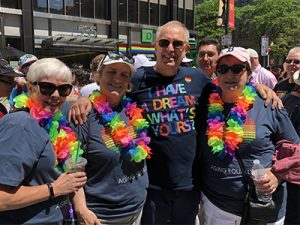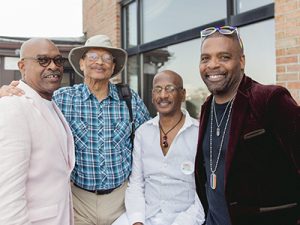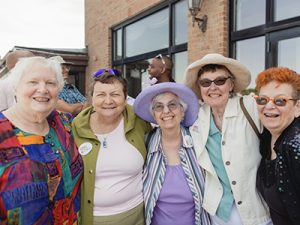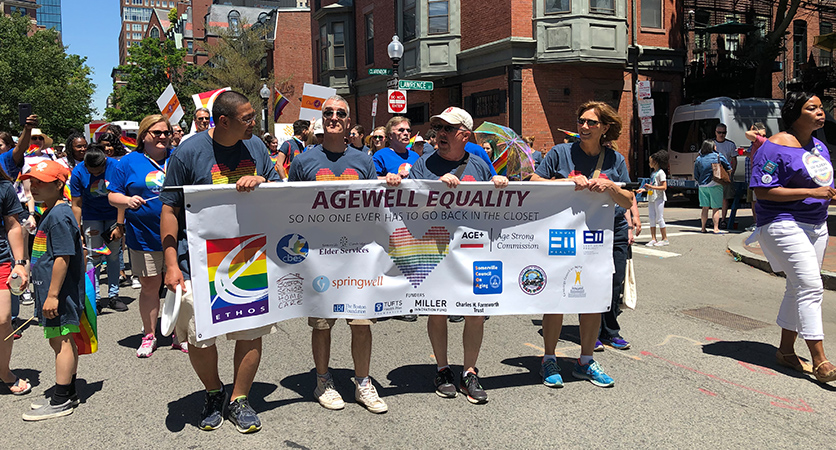Responding to LGBT elders
Ethos
Older LGBT people face unique challenges. With support, Jamaica Plain-based Ethos can do more to change that paradigm.
In recent years, more communities have stepped up to serve the unique needs of older LGBT people. But systemic barriers can be difficult to overcome.
 LGBT elders often avoid mainstream programs for fear of discrimination, lack of trust and lack of cultural competency.
LGBT elders often avoid mainstream programs for fear of discrimination, lack of trust and lack of cultural competency.
Ethos, a private, nonprofit organization that caters to older people and people living with disabilities is helping to remove those barriers.
Leveling the Aging Field for All
Founded in 1973, Ethos is an Aging Services Access Point (ASAP) offering information and referral, case management and other resources for those living in Jamaica Plain, Roslindale, West Roxbury, Hyde Park and Mattapan. The organization has deep experience in the aging LGBT community. In July 2019, they received a two-year $80,000 grant from Tufts Health Plan Foundation to improve the systems used by aging services and help them reach, engage and serve older members of the LGBT community.
The grant supports AgeWell Equality, a vital initiative with a clear mission: Teach aging services organizations in Greater Boston how to serve the needs of older LGBT people living at home.
“The community has made many strides over the last 20 years, but we wanted to go deeper,” said Ray Santos, Chief Development and Community Relations Officer for Ethos. “We wanted to make other organizations as LGBT friendly as we are.”
“This is a major systems change initiative,” Santos said. “We are examining how organizations operate.”
“Many ASAP organizations in Boston and surrounding communities with similar populations were receptive,” continued Santos. “Including the LGBT Aging Project at The Fenway Institute, the Age Strong Commission in Boston and the Council on Aging.”
Tackling the Problem of Isolation
Ethos is highly attuned to LGBT needs. Social isolation is a common concern. In a recent study by the LGBT Aging Commission, over 50% of LGBT respondents cited a lack of social support for their feelings of isolation, compared with roughly 30% of heterosexuals. They also revealed feeling marginalized at twice the rate of heterosexual peers. Many lack traditional support systems like spouses or children to rely on as they grow older. They may be estranged from their biological families. And many lost their chosen families during the AIDS crisis.
 “We take a unique approach to help keep people connected to the community,” said Santos. “But we can’t do it alone.”
“We take a unique approach to help keep people connected to the community,” said Santos. “But we can’t do it alone.”
Ethos works with partners to improve cultural competency, to place more people from the LGBT community on boards and to develop more programs for older LGBT people in the community.
More than most, older LGBT people count on the aging services network to “age well,” a term Ethos defines as “in their own communities and among their own peers.”
“But aging services were seeing the limits of their own training on how to be more culturally competent in their work,” Santos said. “The conditions were right for AgeWell Equality.”
Ethos works with partners to improve cultural competency, to place more people from the LGBT community on boards and to develop more programs for older LGBT people in the community.
Over 50% of LGBT respondents cited a lack of social support for their feelings of isolation, compared with roughly 30% of heterosexuals.
Reaching, Engaging and Serving LGBT Elders
AgeWell Equality’s primary goal is to fuel change within aging services for older LGBT people. At the same time, it’s creating a new model for actively engaging older LGBT people in programs that help improve their health, function and quality of life. The new model replaces outdated institutional systems with systems focused on inclusivity and cultural competency.
 It’s a coordinated multi-pronged approach that aligns with recommendations from the Massachusetts Special Commission on LGBT Aging. It includes training providers on LGBT competency, expanding availability of LGBT-friendly services and creating regional models for reaching LGBT elders.
It’s a coordinated multi-pronged approach that aligns with recommendations from the Massachusetts Special Commission on LGBT Aging. It includes training providers on LGBT competency, expanding availability of LGBT-friendly services and creating regional models for reaching LGBT elders.
“The elder care community got clear and direct recommendations from the legislature to make this a priority, so there was a lot of willingness to look at issues and learn how to implement recommendations,” Santos noted. “We were at an inflection point.”
Among the most successful Ethos programs to come out of the AgeWell Equality initiative are Out4Supper, Café Pride and Out2Brunch. They were designed as safe, affirming environments where older LGBT people make friends, strengthen their support circles and rebuild resiliency.
Activating and Expanding the Conversation
Moving forward, Ethos will focus on activating older LGBT people to be more vocal and “demand more of organizations that help them.”
“Advocacy is going to be really important,” Santos said.
Ethos also will work to expand the conversation around issues like LGBT-friendly housing and nutrition (New England’s first LGBT-friendly housing facility for older people was announced in late 2019. It will open in Boston.);adapt tactics like large forums directed at consumers and service providers to bring the community together and keep the conversation going; and build trust, one of the most important elements in advancing the work that Ethos does.
“If the LGBT community has trust in more organizations, we’ve done our job,” Santos said. It’s important dialogue that goes well beyond the health and economic security of LGBT older people. It’s a smart business decision, competitive advantage and helps bolster capabilities and competency.
Photos Courtesy of Ethos.


